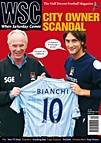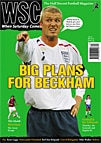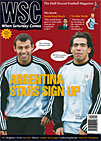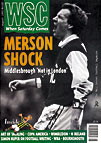 Dear WSC
Dear WSC
I’m sure I’m not the only Wednesday fan disappointed that the recent takeover was unsuccessful. However, whatever the rights and wrongs, our initial disappointment was lessened when we found out that would-be buyer Paul Gregg was a leisure magnate rather than the purveyor of quality pastries to our high streets. I was quite looking forward to Leon Clarke puffing up and down our newly laid pitch with “Steak Bake” emblazoned across his ample midriff.
Paul Sullivan, Pontefract
Search: ' Dejan Savicevic'
Stories
 The league that produced the European champions in its final season. By Jonathan Wilson
The league that produced the European champions in its final season. By Jonathan Wilson
The long-term significance
Given the political situation, 1990-91 is remarkable for having passed off so smoothly. The previous season had been overshadowed by the riot at the Maksimir Stadium in Zagreb between Dinamo’s Bad Blue Boys and Red Star Belgrade’s Delije, hooligan firms that would end up serving at the front and who later saw that clash as the first battle of the Yugoslavian Civil War. However, although political violence flared across the region, crowd trouble remained relatively low-key.
It was, though, the last season of a truly pan-Yugoslav league. The Croatian clubs – Dinamo Zagreb, Hajduk Split, Osijek and Rijeka, as well as NK Zagreb, who would have been promoted – withdrew to join the league of the newly independent Croatia, while Olimpija Ljubljana, Slovenia’s only top-flight representatives, also withdrew. No sides were relegated, with OFK Belgrade (third), Sutjeska Niksic (fourth) and Pelister Bitola (sixth) joining second-placed Vardar Skopje in being promoted from the second division. The season also saw the continuation of the experiment whereby drawn games went to a penalty shootout, with only the winners taking a point, something that was widely seen as having helped Crvena Zvezda – Red Star – in Europe.
 The latest split in the former Yugoslavia was the result of a vote rather than conflict, mercifully, with football playing its part in urging people to vote for independence, as Djordje Nikolic explains
The latest split in the former Yugoslavia was the result of a vote rather than conflict, mercifully, with football playing its part in urging people to vote for independence, as Djordje Nikolic explains
Soon UEFA will have a 53rd member, Montenegro. The entity officially known as the State Union of Serbia and Montenegro lasted only three years; from 1992 to 2003 the two republics had formed what was left of Yugoslavia. In May the voters in Montenegro decided, narrowly, for independence. In the next few months they will become the sixth separate country created from what was Yugoslavia. Given the closeness of the referendum, it’s even possible that football influenced the outcome.
 Although Yugoslavia's players are in other European leagues, the state of the game back home is in crisis. Simon Evans reports
Although Yugoslavia's players are in other European leagues, the state of the game back home is in crisis. Simon Evans reports
Having spent decades just missing out on glory, the Yugoslavs looked set to finally make a decisive impact in a major tournament. Red Star Belgrade had been crowned champions of Europe and the national team – with stars such as Prosinecki, Savicevic and Stojkovic – was among the favourites for the 1992 European Championships in Sweden.